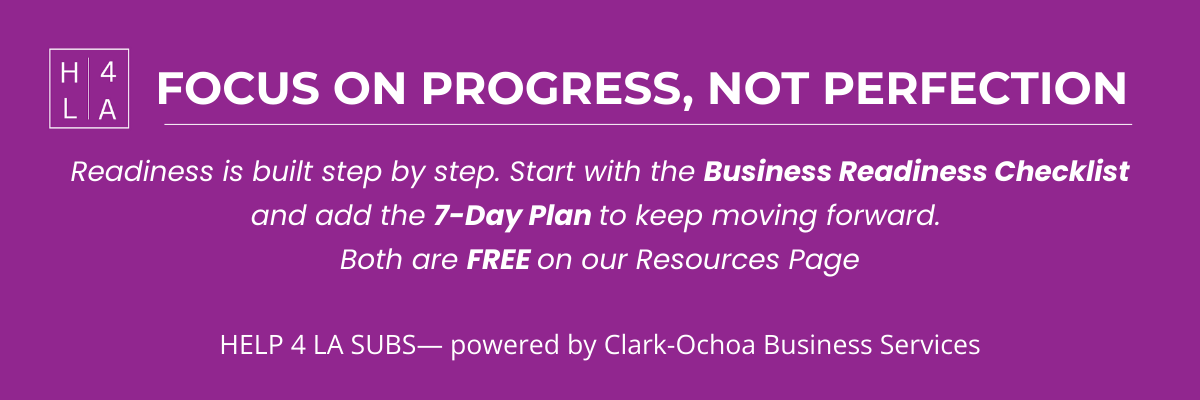Mindset Blocks That Hold LA & OC Subs Back
Los Angeles and Orange County are flush with over $5 billion in new capital and transit projects. So why are so many good, hardworking subcontractors still stuck on the sidelines? The problem isn't a lack of work—it's the mindset blocks.
Over the past decade, working with small and micro businesses across LA and OC, I’ve watched capable companies hold themselves back—not because they lacked skill or experience, but because of their mindset. And I’ll be honest—those same mindset battles have tripped me up, too. Even after years of helping businesses get government-ready, I’ve caught myself asking, Do I really know enough? Can I help my client do this?
Today, I want to highlight five of the most common mindset blocks that can stop small business owners in their tracks. You might recognize yourself in one or more of these. The good news? Once you spot the block, you can move past it. And I’ll show you how.
1. Skipping the Research
One of the most damaging mistakes I’ve seen is assuming that government contracting works the same as the private sector. It doesn’t.
Too often, subs submit bids without doing their homework. For example, because they’ve installed plumbing systems for private clients, they assume the City of Anaheim will buy the same way. Or that LAUSD will automatically open its doors because the sub has worked with other school districts.
Here’s the reality: most agencies have their own vendor portals, certification lists, and each has its own procurement methods. LA Metro differs from OCTA or Caltrans, which differ from the City of Anaheim or DMV. And departments within each agency—such as public works, IT, or facilities—can have their own set of requirements.
I worked with a plumbing subcontractor who submitted a bid for a school facilities project without realizing he needed to be prequalified first. The district only accepted bids from its prequalified vendor pool, so his bid was never even considered.
Research isn’t optional—most agencies require prequalification before bids are even considered.
My opinion: Research isn’t optional—it’s your ticket to eligibility. Skip it, and you’re not even in the game.
2. Fear of Failure
Another block that cripples local subs is the fear of making mistakes. I’ve seen small businesses avoid registering in Cal eProcure or RAMP LA because they’re terrified of “getting it wrong.”
The CEO of a small IT company in Orange County called me, frustrated after missing a chance to submit a bid. Why? He delayed getting his firm’s SBE/DBE certification. All the documents were ready, but he kept second-guessing every detail. While he hesitated, a prime wanted to add him to the team as a first-tier SBE. Without the certification, the prime couldn’t include him. He lost that opportunity—and the chance to build a long-term relationship with that prime.
When we started working together, we secured several certifications, and his firm is now viewed as a low-risk, reliable subcontractor. Instead of being passed over, he’s positioned for repeat work.
Fear of mistakes keeps too many subs from hitting submit and seizing opportunities.
I understood his hesitation because I’ve wrestled with my own version of it. For me, the fear wasn’t about applications—it was about stepping forward as an expert. I worried I wouldn’t know enough or couldn’t answer every question, and that kept me from helping others sooner.
My opinion: Failure teaches; hesitation disqualifies. Progress comes from submitting, not second-guessing.
3. Drowning in Information
Information overload isn’t a sign of opportunity; it’s a roadblock to readiness. If you’re a subcontractor in Southern California, you’ve probably heard the alphabet soup of acronyms: LAWA, OCTA, LA Metro, LAUSD, OUSD, Cal eProcure, PlanetBids. Add in primes that use Deltek, Blue Book, or VendorLine, and it quickly becomes overwhelming—especially when many small businesses recognize the names but don’t fully understand how each system works.
That confusion often leads to another problem: spreading themselves too thin. I’ve seen subcontractors create 20 or even 30 vendor profiles, which is fine until they stop maintaining them. Outdated licenses, expired registrations, or missing certifications in just one system will make them ineligible to participate when the right opportunity is posted.
I know that sense of overload all too well. While my clients wrestled with vendor portals, I was buried in certification renewal requirements, agency forecasts, and prevailing wage updates—details that left me just as overwhelmed.
Focus on Progress, not Perfection.
Overloaded with vendor portals and paperwork? Focus on progress, not perfection.
My opinion: Master one system before you chase them all—excellence in one place opens doors everywhere.
4. Waiting for “Someday”
“I’ll update my insurance later.”
“I’ll finish my capability statement after this job.”
“I’ll apply for certification next quarter.”
Sound familiar? These are the words of procrastination, and they cost subcontractors real money.
A training firm in Los Angeles delayed submitting its renewal application to issue Continuing Education Units (CEUs). The owner was focused on serving clients and delivering programs, and the renewal slipped through the cracks. Unfortunately, this happened just as a local agency released a training contract that perfectly matched its services. Because the firm wasn’t approved to issue CEUs, it was ineligible to bid.
I’ve put things off too. My challenge wasn’t with applications or certifications—it was putting off showing up publicly. For years, I told myself, “I’ll launch the blog later, once everything is perfectly lined up.” But I learned the same lesson I tell my clients: later never comes unless you make it happen.
My opinion: “Someday” is not a strategy. Every day you delay, another sub is getting ready to win.
5. Listening to the Wrong Voices
Caring about what other people think is one of the hardest mindset blocks to overcome. Working with small businesses for more than a decade, I’ve heard it all:
“Government contracting is too much paperwork.”
“I’ll never win against the big guys.”
“That’s not how we’ve always done it.”
And sometimes it’s not business associates or partners, it’s family, friends, or peers who don’t understand the process.
A Whittier printing company I worked with faced this exact situation. His peers told him government work wasn’t worth the hassle. However, he trusted his instincts, registered as a vendor, and ultimately won a contract with a local city’s Parks and Rec department, which kept his crew busy for months.
I’ve had my own version of this, too. Well-meaning people have questioned why I focus so much on small and micro businesses when, they argue, “the money is in bigger clients.” If I had listened, I would have walked away from the very work I’m most passionate about—helping unprepared businesses build the systems and confidence they need to compete for public contracts.
My opinion: Most voices are noise. Tune in to procurement officers, primes, and trusted advisors—the ones who can help move you forward..
Final Thought: Readiness Starts in the Mind
The biggest blocks holding back LA and OC subcontractors aren’t a lack of work, a lack of talent, or a lack of opportunity. They’re mindset blocks: skipping the research, fear of failure, drowning in information, waiting for “someday,” and listening to the wrong voices.
I’ve seen subs let these blocks control their decisions. And I know how easy it is to let those doubts take over—because I’ve wrestled with them too. Readiness starts in the mind. Once you change how you see the process, you can change how you act—and that’s when results start showing up.
If you’re ready to take the next step, go to the Resources page and:
· Start with the Business Readiness Checklist to spot gaps.
· Move on to the 7-Day Plan for a step-by-step path.
Use one or both together to move toward subcontracting success.
Let’s get your house in order—because readiness is your best strategy!
Stephanie
About Stephanie:
Stephanie Clark-Ochoa is a Government Procurement Strategist and founder of Clark-Ochoa Business Services. Through Help 4 LA Subs, she provides practical tools and insights to help micro and small businesses in the Greater Los Angeles area become government-ready and thrive in public contracting.
Disclaimer: This post is for informational purposes only and does not constitute legal, financial, or professional advice. Please consult a qualified advisor before making decisions specific to your business.
🔜 Next Week on the Blog: Why Business Credit Matters for Small and Micro Businesses
Too many small and micro business owners rely on personal credit to fund their companies—but in government contracting, that mistake can cost you opportunities. We’ll break down why business credit matters, how it builds credibility, and what steps you can take to get government-ready.




